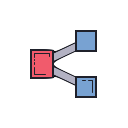Overview:
TheTrim List block enables users to reduce a list to a specified length or define a specific range of indices. This functionality is essential for managing data effectively and focusing on only the necessary elements in any given context.
Inputs & Outputs
| I/O | Feature | Type | Simple Explanation |
|---|---|---|---|
| input | list | any[] | The list that you wish to trim according to the specified parameters. |
| input | no_of_items | number | Indicates how many items should be retained from the start of the list; either this or both start_index and end_index must be provided. |
| input | start_index | number | The index from which items will start being included in the trimmed result. |
| input | end_index | number | The index at which inclusion ends for items in the trimmed outcome. |
| output | trimmed_list | any[] | A new list created by trimming down to either a specified number of items from the beginning or those within defined indices. |
Use Cases
Consider these practical examples of how this block can enhance your workflow:- Limiting List Length: In scenarios such as pagination, where displaying only a fixed number of results is crucial, this block efficiently restricts outputs.
- Selecting List Range: When analyzing survey responses, you may want just particular entries — using this block allows easy extraction based on precise start and end points.
- Data Cleanup: During data processing, unnecessary elements can burden analysis; utilizing this tool clarifies datasets by removing excess information seamlessly.
- Data Filtering: In cases where you’re collecting user feedback across various categories, use specifications with range limits to extract only pertinent insights that improve reporting quality.
Trim List block proves invaluable!